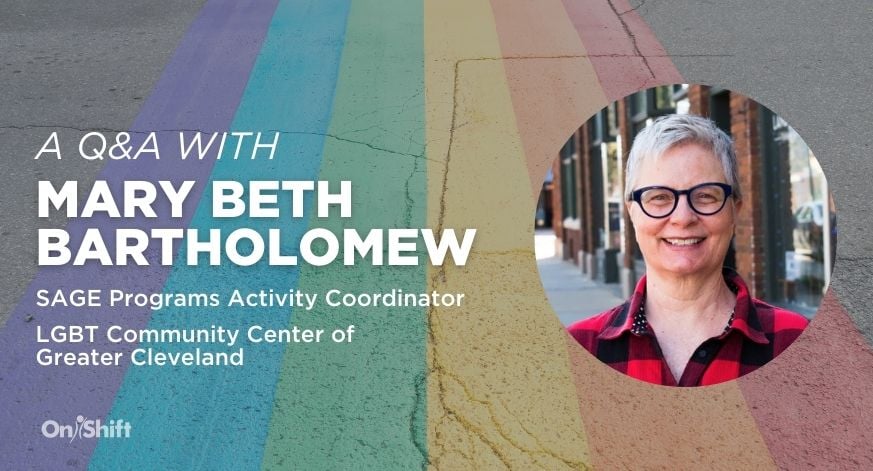June 15, 2021 | Tommy Marzella
June 15, 2021 | Tommy Marzella
 If you recall, a couple of years back, we sat down with Mary Beth Bartholomew, SAGE Programs Activity Coordinator for the LGBT Community Center of Greater Cleveland.
If you recall, a couple of years back, we sat down with Mary Beth Bartholomew, SAGE Programs Activity Coordinator for the LGBT Community Center of Greater Cleveland.
When we tapped into Mary Beth's expertise in 2019, she shared some fantastic tips for creating inclusive environments for LGBTQ+ seniors. To provide a bit of background, the SAGE organization tirelessly advocates for LGBTQ+ seniors in an effort to help them age with respect and dignity -- offering educational resources and working with senior care organizations and industry associations, such as LeadingAge, to provide LGBT cultural competency training.
This year, we thought we would check in to see how the program has evolved to meet the unique needs of this group during the pandemic and if she had any new tidbits of advice to offer senior care providers in the new normal.
Check out the Q&A below and be sure to watch our video interview from 2019.
1. What were the unique needs of LGBTQ+ seniors during the pandemic?
The large majority of older LGBT adults live alone and do not have adult children to offer emotional and physical support. These two facts have enormous implications for this community. Older LGBT adults must rely on an informal network of friends or institutions to care for them and meet their needs. If these connections are weak, needs can go unmet. There is a link between isolation and cardiovascular disease, so we can assume that health disparities, including depression, kick in and are a factor as well.
2. How did you address them?
SAGE Cleveland offered virtual programming 3 days a week throughout the 14 months of the pandemic lockdown. It’s not perfect, and not everybody enjoys or has access to the technology, but it did offer some connection for some of our participants. Oftentimes, it was beneficial to just log on and talk and “see” each other. We received a donation of Computer Tablets from the National Council of Jewish Women Cleveland so that folks without access to technology could participate in our check-ins, virtual programming, and email friends. Regular phone calls were made to the most isolated. The LGBT Center also provided boxed lunches, for pick up, on Mondays, Wednesdays, and Fridays, and a grocery delivery program 2 times per month.
3. What are the long-term impacts of the pandemic on LGBTQ+ seniors?
I think that it’s too early to know. We are just starting to slowly open to in-person programming. Though, for the time being, it is only once a week, we are seeing record numbers in attendance, and we are seeing people who have never participated in SAGE Cleveland coming in for socialization and exercise. People talk about stress and some, depression, and there is still some fear and uncertainty about what lies ahead.
4. Can you offer any new tips for senior care providers to be more inclusive of LGBTQ+ residents?
It would be a good idea for providers to talk with clients about how they got through the past 14 months, and how they are doing today as a result. Ask, specifically, about how much interaction they may have had with others, how they fed themselves, etc. Ask how they describe their “family.”
5. What would you say are the unique needs of LGBTQ+ seniors compared to those of younger LGBTQ+ generations?
Older LGBT adults grew up in a time period when it was still illegal to be LGBT. When SAGE has big social events, we take group pictures of everyone. There is always a significant number of people who do not want to be in the photo because they still afraid of being “out.” There is also a technological divide. Perhaps young people may define being on social media as a “social event.” Older adults in the LGBT community want in-person interaction, what they’re used to. Young LGBT people also may present their gender expression and identity in unique ways. Older adults learned early on to look like everyone else; to not stand out for their own protection and sense of security.
6. Do you have any recommendations for encouraging LGBTQ+ seniors to express themselves and feel more comfortable doing so?
There are a number of ways SAGE participants can safely express themselves. The Center has a new intergenerational program that includes opportunities to share stories in a podcast with a young person, a pen pal program, and a book club. Oftentimes, there are personal interest and assets mapping surveys to be completed a well. Earlier this Spring, SAGE folks participated in a series of focus groups for a Case Western Reserve University research project on health disparities and gaps in the LGBT community. And, of course, older LGBT adults and allies can always attend our in-person programming that takes place in a safe and affirming environment!
Click here to learn more about this incredible organization and how they're helping LGBTQ+ elders thrive. And be sure to check out their PRIDE page for community and advocacy resources.
Subscribe to the OnShift Blog
Recent Posts
Categories
About Tommy Marzella
Tommy Marzella is a Portfolio Marketing Manager for OnShift.
See for yourself why thousands of providers rely on OnShift’s innovative software for recruitment, hiring, workforce management, pay and engagement. Request your personalized demo today.
